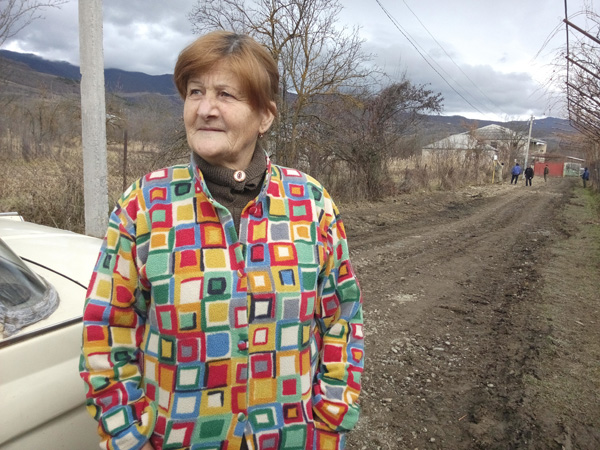Lado Bichashvili, Shida Kartli
To reach the Zardiaantkari village you have to cross two blockposts and approaching the third one, Georgian soldier will show you to stop a car by waving his hand. It has been last checkpoint after occupation line was marked since 2008 armed conflict. There are eight houses in the so-called neutral territory between Georgian and Ossetian blockposts. Officers standing at the neighboring blockpost did not miss movement of Georgian journalists. Ossetian and Russian soldiers watched group of journalists through glasses. One of the Georgians greeted them by waving the hand and after this generous gesture two of three soldiers disappeared but one still continued watching them. Georgian police allowed the representatives of about ten media sources to enter the so-called neutral territory, which had arrived there in the frame of the study trip organized by the Institute for War and Peace Reporting (IWPR).
Locals complain about hard social situation in the village adjacent to the occupied territory; mostly elderly people live there. After the war in 2008, only 72-year-old Tamar Kakashvili remained in the house of seven-member family. “I celebrate neither new nor old year” she started conversation and continued: “We do not have firewood and food. They do not assist us at all; we have only pension and social aid. My family was split after the war; they still live in different kindergartens in Gori.” International organizations renovated one room in the two-storied house of Tamar Kakashvili, which was destroyed during the war.
Infrastructural projects are implemented in the strategic village. During the interviews with the locals, specialists were checking pressure of natural gas in the pipes. “It is final technical activities and the village will be supplied with gas in a few days,” one of the workers said.
Luda is ethnic Ossetian lady; she showed us a food-path which she walks several times per month to take fruit to the occupied territory by small cart; she either sells or exchanges them into other products there. Ms. Luda is not sociable with journalists; she did not even say her surname; we heard her name when a neighbor called her.
Elene Gablishvili returned to the village a year ago; she lived in a kindergarten in Gori during five years. She said she had to start life from the beginning upon return in the village. The main income of the family is from farming; she cut down the fruit-garden after return because they did not have firewood. The Gablishvilis are one of the last inhabitants of the village and have started preparation for the New Year too.
Elene Gablishvili: “Now we respect peace the most and it will be our first wish for New Year. We have a lot of problems. Our houses were destroyed; everything went wrong during those five years we lived outside the village. The government did not assist us; they repair water supply, gas pipe lines, irrigation system in the village and if it continues like that people, who currently live in kindergartens, will return to the village.”
300 families lived in Zardiaantkari before 2008 Russian-Georgian War. Nowadays, only 50 families meet New Year there.
News
December 13, 2023
Ethnic minorities outside the peace dialogue
November 6, 2023
‘Peace’ agenda of political parties
Popular
Articles
February 13, 2024




